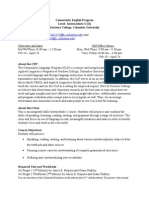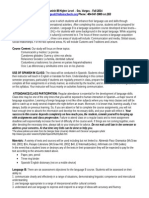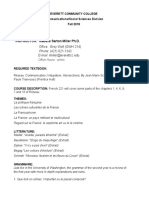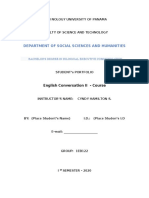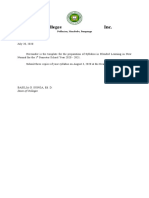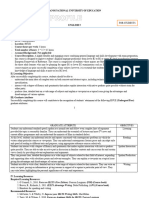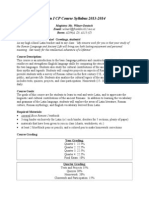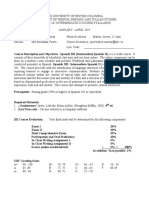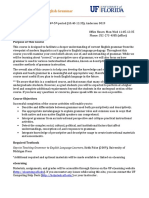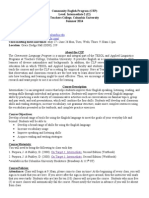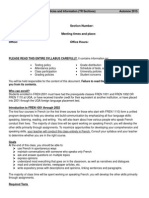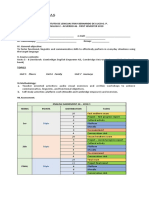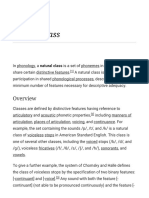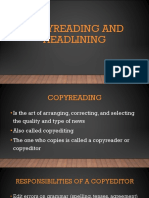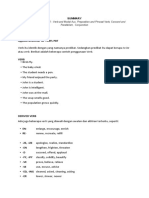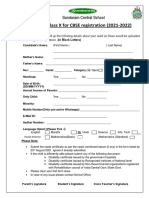HC Fall 2024, LAT-101 Cou…
Hunter College, Fall 2024
LAT-101: Beginning Latin, Tues/Th 5:30-6:45 PM;
Rm 410W Online Syllabus: via
Blackboard
Instructor: Louise Michaud
Office Hours: Tues/Thursday 6:45-7:15 PM or by
appt, Room 1431
Email: lmichaud@hunter.cuny.edu
Course Overview:
This course explores the basic grammar, syntax,
morphology and vocabulary of the Latin language.
You will also learn language terminology and garner
insights into the culture and history of the Romans.
Your study of Latin will give you an overview of both
Latin and English grammar, and will encourage you
to think critically about meaning and word formation.
Required Texts:
There are two required texts for this course. Paper
versions are strongly suggested.
I. Shelmerdine, Susan C. Introduction to
Latin. 2nd Edition. Focus Publ. ISBN: 978-1-
58510-270-9.
II. Maxey, Mima. A New Latin
Primer. Enchiridion Press. ISBN-
10: 946943029; ISBN-13: 978-1946943026
All students are required to have the textbooks in
order to fully participate in the class. It is
recommended that you have a paper copy of the
text so that you can participate in exercises with your
peers during the classes or easily access
dictionaries. Please bring the books to every class.
There is also an online accompaniment produced by
the publisher for the primary text. There you can
listen to audio, practice exercises, use flashcards
and download full vocabulary lists.
Free Latin Tutoring:
The department provides free Latin tutoring Tuesday
and Wednesday, 1:30-3:30 PM in the Classics
library (1442 HW). Please take advantage of this
resource.
Communication:
The fastest way for me to get you messages and
other course materials is via the free and secure
Remind app. This is a private text messaging
system. To enroll, please send the message
@HCLatin to the abbreviated phone number 81010.
Respond to the return text by typing in your full
name. Please do not use nicknames or
abbreviations. You may also download the free
Remind app for Android or IOS, though this is not
necessary for signing up.
Please be advised that the syllabus may be subject
to modification. Any changes will be reflected on the
live syllabus posted on Blackboard.
Please email me with any questions or concerns
pertaining to the course, or use the chat feature on
the Remind app. Emails will generally be returned
within 24 hours.
Course Delivery:
This course is conducted in person on campus. This
means that you must attend class at the regularly
scheduled Tuesday and Thursday time periods (5:30
PM to 6:45 PM). You are advised to have a working
computer with a soundcard, anti-virus protection and
an internet connection to complete this course
successfully. It is not advisable to depend
exclusively on a phone for this course. If you need
assistance with securing internet and other
resources, please visit:
https://ww2.hunter.cuny.edu/students/student-
life/emergency-support-and-resources/internet-wifi-
resources/
You will need Adobe Acrobat Reader (PDF),
Microsoft Word or Google Docs to post to
BlackBoard assignments. Upload your documents to
the appropriate assignment links on Blackboard. It is
also recommended that you use Chrome as your
browser.
Assignments will be posted and submitted to
Hunter’s Blackboard. To prevent miscommunication
or confusion over emails, emailed assignments will
not be accepted, so please watch for due dates.
Course materials will be organized by chapter.
Assignments will be due on the following class in
order to keep pace with the content. There will also
be bi-weekly quizzes. Following this schedule will
help keep you on track towards success. Please
permit a week’s lag time for me to grade your
assignments from time of submission.
Course documents/assignments will generally be via
Google docs. Click on the links provided for these
and save a copy to your computer before completing
any work.
A Note on Vocabulary
This course requires memorization of Latin
vocabulary. I strongly suggest flashcards for this
purpose and I highly recommend daily study. Quizlet
digital flashcards will be embedded in your
Blackboard class, but you should make physical
flashcards from these. The app for Android and IOS
is free to download and will enable you to study
anywhere.
All vocabulary must be learned and reviewed
periodically. You are not permitted to access a
dictionary during assessments.
Online Translators and Artificial Intelligence:
The use of online translators such as Google
Translate is not permitted and will lead you to many
mistakes. Our purpose here is to learn the language.
The use of an online translator will be considered
academic dishonesty. The use of AI such as Chat
GPT to complete assignments also is prohibited.
Such assignments will receive a failing grade and
may result in referral.
Online Etiquette:
A) Kindly observe the following courtesies for
the bene5t of all:
● Avoid offensive language. Avoid excessive
slang that could lead to misinterpretation.
● Observe the conventions of standard
written English to the best of your abilities.
Avoid shortened text language.
● We have many students from around the
world for whom English is a second
language. Never make fun of anyone’s ability
to read, speak or write English.
● Be open-minded about ideas and
expressions that may not reFect your
opinion.
● Do not access notes, electronic devices
and resources when completing online
quizzes and your 5nal exam.
B) Sending Emails
● Include the course name LAT-101 or “Latin”
in your subject line.
● Use a proper opening salutation as you
would with any letter. Avoid beginning your
emails with “Hey”.
● Avoid the use of shortened text language,
e.g. U for you, etc.
● Observe English writing standards.
● Your closing should include your full name.
● Think and edit before you post or hit the
“send” button.
Time Expectations:
This course anticipates a minimum of three hours of
study per class. Considerable time is needed to
complete assignments, readings, study vocabulary
and review for assessments. Please be sure that
you do not fall behind on your reading, assignments
and the sequence of postings. Vocabulary review
should be ongoing.
This course covers a great deal of content and
requires self-discipline and academic commitment. It
is important to follow the schedule of lessons and
assignments so that you do not feel overwhelmed
and can stay on track. It is also very important to
study your content daily. All content, quizzes and
exams are cumulative.
Feeling Overwhelmed?
Do not feel that you cannot reach out to me just
because we are meeting online. Your professors do
not want you to have an impersonal experience in a
course that is only between you and the computer. If
you are having difficulty keeping up with
assignments or are feeling overwhelmed, reach out
as soon as possible. Be proactive in informing your
instructors when situations arise that may impact
your ability to complete the course.
Assessments and Grading:
You will be assessed according to the following
categories:
Participation & Classwork (25%)
Homework & Preparation: (25%)
Quizzes: (30%)
Cumulative Final Exam: (20%)
Participation & Financial Aid Requirements:
N.B. Your professors are required to submit a VOE or
Veri5cation of Enrollment for each student at the
beginning of the term. Federal 5nancial aid
regulations require students to participate at least
once during the 5rst two weeks. Logging into an
online course without active participation in
completion of a discussion or assignment does not
constitute participation. It is advisable to follow the
schedule of assignments and content to avoid this
issue.
Participation in the course will be based upon 1)
regular attendance 2) whether you were prepared to
participate in class activities and review of
assignments, 3) whether you demonstrated interest
by asking questions, 4) whether you took notes and
corrected work in class, and 5) whether you
accessed course content multiple times per week.
Hunter’s Grading Scale:
Letter GPA Grade Grade
Grade Value Scale % CR/NC Scale
A+ 4.0 97.5 – CR 70.0 –
100% 100
A 4.0 92.5 –
97.4%
A- 3.7 90.0 –
92.4%
B+ 3.3 87.5 –
89.9%
B 3.0 82.5 –
87.4%
B- 2.7 80.0 –
82.4%
C+ 2.3 77.5 –
79.9%
C 2.0 70.0 –
77.4%
D 1.0 60.0 –
69.9%
F 0 0.0 – NC 0.0 –
59.9% 59.0
Learning Outcomes:
By the end of the semester, it is expected that you
will have learned to:
1. Gather, interpret, and assess information from a
variety of sources and points of view.
Through reading in the target language, students
gather, interpret and assess Latin text from a wide
variety of authors and times, which incorporates
varying perspectives. Students memorize
vocabulary, morphology, and grammar and employ
this information on oral and written assignments and
tests.
2. Evaluate evidence and arguments critically or
analytically.
Exams as well as written and oral assignments will
ask students to evaluate evidence
critically/analytically by asking them to make
appropriate choices, informed by their knowledge of
Latin vocabulary, forms, and syntax.
3. Produce well-reasoned written or oral arguments
using evidence to support conclusions.
From the earliest stages of learning Latin, students
are required to answer questions about the
language and to justify their answers by providing
evidence and supporting conclusions. For example,
an English translation of a Latin phrase or sentence
involves several steps that can be explained and
justified.
4. Identify and apply the fundamental concepts and
methods of a discipline or interdisciplinary field
exploring world cultures or global issues, including,
but not limited to, anthropology, communications,
cultural studies, economics, ethnic studies, foreign
languages (building upon previous language
acquisition), geography, history, political science,
sociology, and word literature.
The adapted, authentic Latin texts read in beginning
Latin provide a window onto the culture of the
Romans and other cultures using the Latin
language. Second language learning always
involves reflection upon one’s native language, by
contrast, and so a larger global context is always
introduced through foreign language study. This
encounter with another culture and language takes
the form of recognition of linguistic and cultural
differences, from the micro level of vocabulary, form,
and syntax differences to the macro level of
historical, cultural, philosophical differences. All
assignments and assessments involve evidence-
based conclusions.
5. Analyze and discuss the role that race, ethnicity,
class, gender, language, belief, sexual orientation,
or other forms of social differentiation play in world
cultures or societies.
Readings from Roman comedy, history,
philosophical essays, letters, lyric poetry, etc.
automatically involve these issues. Assignments and
assessments require the application of linguistic and
cultural knowledge.
6. Speak, read, and write a language other than
English, and use that language to respond to
cultures other than one's own. The beginning Latin
classroom involves reading, speaking, listening, and
writing in the target
language of Latin, even if much of the class is
conducted in English. Short oral or written
composition exercises provide a context in which
students can use the target language to respond to
Roman culture. Translation exercises require
students to understand a culture other than their
own.
Academic Integrity
All phones and electronic devices must be off, away
and out of sight during quizzes or tests. If a phone is
found in use or hidden on laps, etc., it will invalidate
your assessment.
Honor and maintain a commitment to integrity. As a
student at Hunter, you are expected to maintain
professionalism, active learning and participation in
this class, and academic behavioral integrity in and
out of the physical classroom.
The use of ChatGPT or any other site connected to
this or any other source that uses AI-based
technology is considered plagiarism and academic
dishonesty. Such assignments will result in failing
grades and risk referral.
Hunter College regards acts of academic dishonesty
(e.g., plagiarism, cheating on examinations,
obtaining unfair advantage, and falsification of
records and official documents) as serious offenses
against the values of intellectual honesty. The
college is committed to enforcing the CUNY Policy
on Academic Integrity and will pursue cases of
academic dishonesty according to the Hunter
College Academic Integrity Procedures. For more
information on academic integrity, please see
http://www.hunter.cuny.edu/provost/academic-
integrity.
Please note that any assignments or assessments
with evidence of academic dishonesty will not be
granted credit. In addition, you may be subject to
referral.
Office of AccessABILITY
"In compliance with the American Disability Act of
1990 (ADA) and with Section 504 of the
Rehabilitation Act of 1973, Hunter College is
committed to ensuring educational parity and
accommodations for all students with documented
disabilities and/or medical conditions. It is
recommended that all students with documented
disabilities (Emotional, Medical, Physical and/or
Learning) consult the Office of AccessABILITY
located in Room E1124 to secure necessary
academic accommodations. For further information
and assistance please call (212-772-4857) TTY
(212-650-3230)."
Hunter College Policy on Sexual Misconduct
“In compliance with the CUNY Policy on Sexual
Misconduct, Hunter College reaffirms the prohibition
of any sexual misconduct, which includes sexual
violence, sexual harassment, and gender-based
harassment retaliation against students, employees,
or visitors, as well as certain intimate relationships.
Students who have experienced any form of sexual
violence on or off campus (including CUNY-
sponsored trips and events) are entitled to the rights
outlined in the Bill of Rights for Hunter College. a.
Sexual Violence: Students are strongly encouraged
to immediately report the incident by calling 911,
contacting NYPD Special Victims Division Hotline
(646-610-7272) or their local police precinct, or
contacting the College's Public Safety Office (212-
772-4444). b. All Other Forms of Sexual Misconduct:
Students are also encouraged to contact the
College's Title IX Campus Coordinator, Dean John
Rose (jtrose@hunter.cuny.edu or 212-650-3262) or
Colleen Barry (colleen.barry@hunter.cuny.edu or
212-772-4534) and seek complimentary services
through the Counseling and Wellness Services
Office, Hunter East 1123. CUNY Policy on Sexual
Misconduct Link:
http://www.cuny.edu/about/administration/offices/la/P
olicy-on-SexualMisconduct-12-1-14-with-links.pdf
Syllabus: Except for changes that substantially
affect implementation of the evaluation (grading)
statement, this syllabus is a guide for the course and
is subject to change with advance notice. Review
the syllabus via Blackboard for any updates.
Schedule of Assignments:
Date Topics/Chapters Assig
(Due
class
8/29: Thurs, Introduction, Course Pronu
Class 1 Expectations Practi
Pronunciation and the Make
Alphabet flashc
Parts of Speech and le
vocab
9/3: Tues, Class Chapter 1: Principle Ch. 1
2 Parts; Enclitic -ne 1st
& 2nd Conjugation
Verbs;
9/5: Th, Class 3 Chapter 2: Gender, Ch. 2
Number & Cases of Make
First & Second flashc
Declension Nouns; and le
Conjugation vocab
identification
9/10: Tues, Chapter 3: Genitive & Ch. 3
Class 4 Dative Cases Make
flashc
and le
vocab
9/12: Th, Class 5 Ch. 1-3 Review Study
Quiz #
9/17: Tues, Chapter 4: Adverbs, Ch. 4
Class 6 Ablative Case; Make
QUIZ #1 Ablative of flashc
Means/instrument; and le
Ablative of Place vocab
9/19: Th, Class 7 Chapter 4: More Comp
Ablative Practice; outsta
Reading Workshop readin
exerci
9/24 Tues, Class Chapter 5: 1st & 2nd Ch. 5
8 Declension Make
Adjectives; flashc
Substantive Nouns; and le
Ablative of vocab
Accompaniment;
Ablative of Manner;
Irregular Verb “Esse”
9/26: Th, Class 9 Chapter 6: Imperfect Ch. 6
Tense; Imperatives Make
flashc
and le
vocab
10/1: Tues, Chapter 6: Reading Comp
Class 10 Workshop outsta
readin
exerci
10/3: Th Ch. 4-6 Review Study
COLLEGE Quiz #
CLOSED Revie
vocab
date.
10/8: Tues, Ch. 7: 3rd Declension Ch. 7
Class 11 Nouns; Dative of Make
QUIZ #2 Possession; Imperfect flashc
& Future Tenses of and le
“Esse” vocab
10/10: Th, Class NO CLASS Study
12 Vocab
10/15: Tues Chapter 7: Reading Comp
HC FOLLOWS Workshop outsta
MON SCH readin
exerci
10/17: Th, Class Chapter 8: Perfect Ch. 8
13 Tense; Perfect Active Make
Infinitive; Irregular flashc
Verb “Possum” and le
vocab
10/22: Tues, Ch. 8: Reading Comp
Class 14 Workshop outsta
readin
exerci
10/24: Th, Class Chapter 9: 3rd Ch. 9
15 Conjugation Verbs; Make
Imperatives & flashc
Vocatives; Personal and le
Pronouns ! vocab
10/29: Tues, Chapter 7-9: Review Study
Class 16 Quiz #
10/31: Th, Class Chapter 10: Ch. 10
17 Demonstrative Make
QUIZ #3 Pronouns & flashc
Adjectives; Personal and le
Pronouns II; -ius vocab
Adjectives
11/5: Tues, Chapter 10: Reading Comp
Class 18 Workshop outsta
readin
exerci
11/7:Th, Class Chapter 11: Future Ch. 11
19 Tense of 3rd & 4th Make
Conjugations; flashc
Numerals, and le
Expressions of Cause vocab
11/12:Tues, Chapter 11: Reading Comp
Class 20 Workshop outsta
readin
exerci
11/14: Th, Class Chapter 12: 3rd Ch. 12
21 Declension Make
Adjectives; flashc
Expressions of Time and le
vocab
11/19 Tues, Chapter 9-12 Review Study
Class 22 Quiz #
Revie
vocab
date.
11/21: Th, Class Chapter 13-14: 4th Ch. 13
23 Conjugation; Ablative Exerc
Quiz #4 of Make
Respect/Specification; flashc
Accusative of and le
ExtentPronouns III: vocab
Interrogatives,
Reflexives &
Possessives;
11/26: Tues
Class 24
11/28:
THANKSGIVING
12/3: Tues, Ch. 13-14: Reading Comp
Class 25 Workshop: outsta
readin
exerci
12/5: Th, Class Chapter 15: Perfect, Ch. 15
26 Pluperfect, Future Make
Perfect Tenses; flashc
Perfect Active and le
Infinitive and 4th vocab
Declension Nouns
12/10: Tues, LNM Chapter 15: Comp
Class 27 Reading Workshop readin
exerci
Study
Final E
12/12: Th, Class Last Class --Review Study
28 Final E
Edit
12/17: with theFINAL
Tues Docs app
EXAM 5:20-
7:20 PM
Make tweaks, leave comments and share
with others to edit at the same time.
NO, THANKS GET THE APP
Bonam fortunam!


